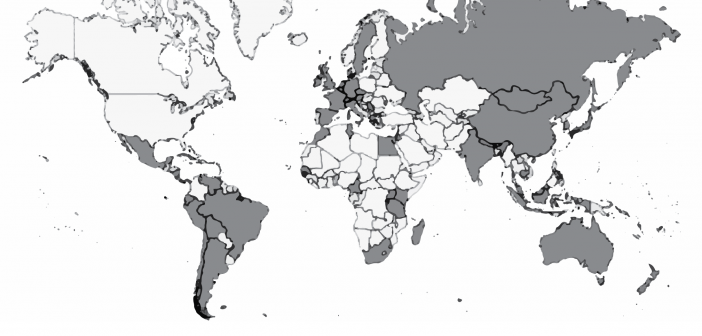When more than 30 people were killed in a bombing in Brussels on March 22, Lehigh officials sent an email to students studying abroad to confirm their locations and safety statuses. The email also detailed the resources available to students while abroad, including International SOS, their host program providers and Lehigh’s counseling and psychological services.
There are 120 Lehigh students studying abroad for the Spring 2016 semester, Kathryn Welsh Radande, the interim director of Study Abroad and Global Experiences said. No students are participating in a Belgium-based study abroad program, but Megan Chang, ’17, traveled to Brussels on March 22 from Spain. She arrived in Brussels six hours after the bombings.
“I was shocked,” Chang wrote in an email. “I was horrified by what happened. The death toll kept on going up. I was scared to see what Brussels would be like when I arrived. I didn’t know if people were going to be in a panic or if the streets would be empty.
“There was a memorial in front of the stock exchange building. I passed by it when I first got to Brussels and people, not just Belgians, were writing messages in chalk. When I was leaving Brussels, there was a lot more people and camera crews outside the building. People were holding flags and lighting candles.”
After she was back in Barcelona, Chang said she feels safe. She does, however, travel with friends at all times for security.
To ensure students’ safety, Lehigh provides International SOS cards at pre-departure meetings. According to the Lehigh Study Abroad Office website, International SOS, which is a partner program with Lehigh, is a “24-hour international medical, security and travel assistance provider.”
In addition, the International Travel Advisory Committee and the Lehigh International Crisis Advisory group are two groups made of faculty members who work to oversee study abroad programs.
The International Travel Advisory Committee, established by Provost Pat Farrell in 2012, meets every two weeks to review all undergraduate student travel. Welsh Radande said they also discuss policies and procedures and monitor the U.S. Department of State, Centers for Disease Control and Prevention and World Health Organization for any potential threats to Lehigh students.
Lehigh’s International Crisis Advisory group meets when there is an international crisis abroad. According to the university’s International Affairs website, the group “oversees the international Emergency Response Plan and acts as on-call responders for crisis management on Lehigh-led programs.” They then make decisions and recommendations about the safety of students.
According to the U.S. Department of State, countries that are potentially unsafe can receive a travel alert or travel warning. The U.S. Department of State classifies a travel alert as a short-term situation, while a travel warning is classified as a long-term warning until the country’s situation changes. With a long-term warning, it is strongly suggested to not travel to the country at all.
“Lehigh’s policies about travel warnings is that we don’t send students and faculty to countries or regions where there is a significant travel warning without a very thorough review,” Welsh Radande said.
Welsh Radande said 300 Lehigh students are signed up to participate in a study abroad program this summer. Two of the faculty-led study abroad programs will be held in Belgium and Paris, the latter of which was attacked by terrorists in November. The Paris and Belgium programs are continuing as scheduled, but the International Advisory Committee will monitor the status of these areas before canceling the programs.
If students feel unsafe traveling abroad and want to withdraw from a program as a result, they follow the Study Abroad Office’s withdrawal procedures.
Foreign educational programs are monitored to prevent any tragedies when possible, such as the death of 16-year-old Tyler Hill during a People to People study abroad program. His parents, Sheryl and Allen Hill, created the ClearCause Foundation in his honor to teach students precautionary techniques and provide students with necessary resources to study abroad.
“Studying abroad is dangerous, just like driving a car is dangerous,” said Hill, the executive director of ClearCause Foundation. “Both are not safe, but the benefits are there, so we do it. The important thing is to be aware when the U.S. government says not to travel.”
Hill said the organization clearly outlines tips students should know when traveling abroad. Among these tips is keeping important information in an iCloud such as passport, driver’s license, credit cards and medical information for easy access in case of an emergency, she said.
Some countries have different emergency numbers for ambulance, police and fire services, Hill said. She believes it is important students know how to communicate in the native language in case of an emergency. She recommends learning a few key phrases or using the Google Translate app to assist with communication.
“You should not rely on the school, you should know what to do,” Hill said. “We need to teach students so they know what to do when things happen in foreign countries. My son would be alive today if he knew he knew he was eight minutes away from the Japanese Red Cross Hospital. He was relying on supervisors to take him. You need to know how to take yourself.”






Comment policy
Comments posted to The Brown and White website are reviewed by a moderator before being approved. Incendiary speech or harassing language, including comments targeted at individuals, may be deemed unacceptable and not published. Spam and other soliciting will also be declined.
The Brown and White also reserves the right to not publish entirely anonymous comments.